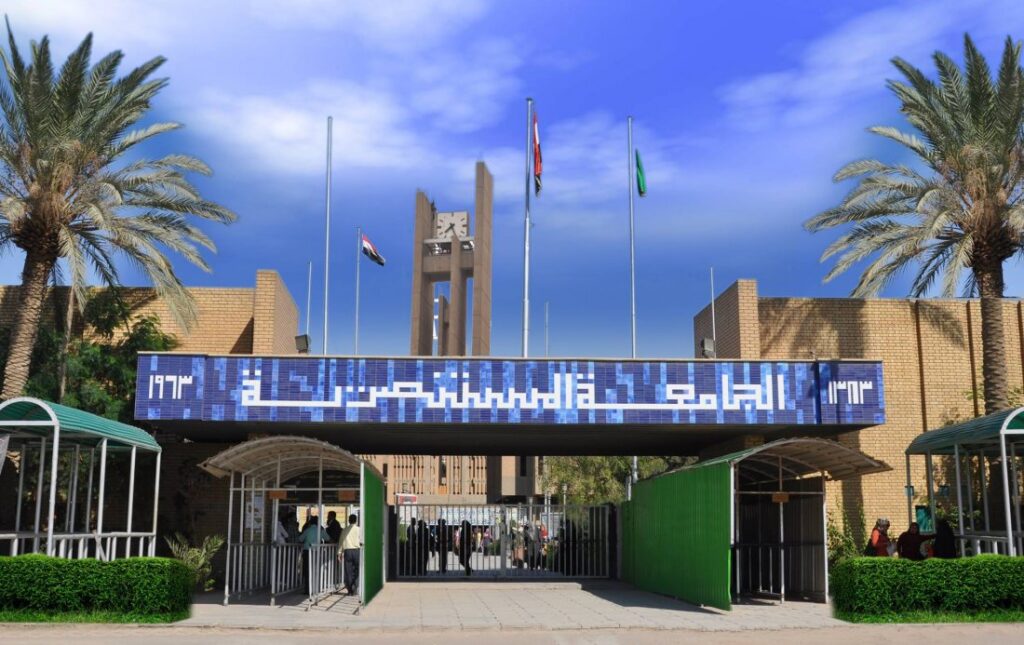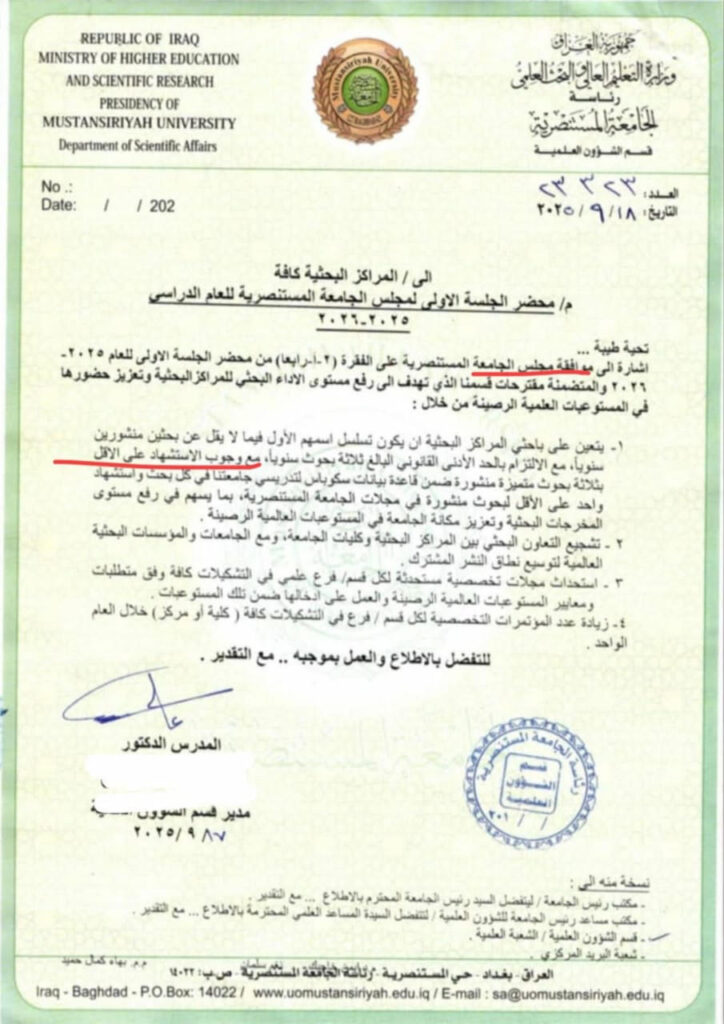
At the University of Technology in Baghdad, students must publish papers citing the school’s own journals if they wish to graduate, as we reported earlier this month. But down the road at Mustansiriyah University, one of Iraq’s highest-ranked institutions, researchers are facing even steeper citation requirements, according to new evidence we obtained.
In a letter (in Arabic) sent to the school’s six research centers on September 18, the university council requires researchers to be first authors on at least two “of the legal minimum of three research papers” they must publish every year.
Each of these papers must cite at least three articles other faculty members at the school have published in Scopus-indexed journals, as well as one or more articles in the university’s own publications.
Doing so will contribute “to raising the level of research output and enhancing the university’s position in respected international publications,” according to the council, the school’s highest authority.
Stuart Macdonald, a visiting professor at the University of Leicester in England who has written about citation gaming, called the requirement “a new low.”
”Citation coercion is usually more subtle than this,” he told us. ”Perhaps Mustansiriyah University should be congratulated for being so open in its compulsory corruption.”
The newsletter Fraud Factor posted a translation of the letter today, as well as additional documents on citation requirements for postgraduate students.
Another document we obtained from Mustansiriyah’s College of Engineering sets out identical citation requirements for academics on research sabbaticals. In return for fulfilling the publication requirements, researchers will receive a letter of appreciation from the dean, the document adds. Such letters can earn faculty members extra points on their yearly evaluations, according to an Iraqi academic, who requested anonymity for fear of reprisal.
Mustansiriyah University did not respond to requests for comment.
Iraq has been on a mission to boost the rankings of its universities and scientific journals, which are increasingly getting indexed in influential international databases. Two of Mustansiriyah’s publications – the Iraqi Journal of Hematology and the Journal of Engineering and Sustainable Development – are included in Elsevier’s Scopus, and the former also appears in Clarivate’s Emerging Sources Citation Index.
University rankings, which are often used for advertising, are tied to citation and publication counts. Many rely on Scopus data. While author self-cites are typically excluded, self-citation by institutions is not.
In a country where little or no funding is available to do research, coercive citation may be less of a problem than the mere requirement for publications.
Some researchers “might become really afraid of getting fired, for example, because there is a pressure on them to publish,” said Lokman Meho, a university librarian and professor at the American University of Beirut in Lebanon, who has developed an index to flag potential research-integrity problems at universities.
“They will do all it takes, even if it is cheating, even if it is unethical, to meet those requirements,” Meho said. “So this is where the government and the universities are incentivizing and forcing people to do unethical things.”
Like Retraction Watch? You can make a tax-deductible contribution to support our work, follow us on X or Bluesky, like us on Facebook, follow us on LinkedIn, add us to your RSS reader, or subscribe to our daily digest. If you find a retraction that’s not in our database, you can let us know here. For comments or feedback, email us at [email protected].

Probably time for journals to stop considering any Mustansiriyah papers for publication until there is positive evidence that they’ll have revoked this policy.
“In return for fulfilling the publication requirements, researchers will receive a letter of appreciation from the dean” I have never heard of anything so stupid before. Wow.
A classic Carrot and stick policy, greetings from Iraq
Related official document from another Iraqi university
https://www.facebook.com/share/p/1AnN2nBzRR/
I’m an Iraqi PhD student. Currently, we are suffering from the same shady practices mentioned in your articles. We are thankful for the coverage but , unfortunately, neither the minister of higher education nor the Universities councils are taking any steps to reform. All they care about is raising the H-index of the faculty by forcing two supervisors from the same institution on the students in order to list their names as co-authors. Another measure is by forcing institutional self citations on every publication. All these without any support or funding to the researchers.
Honestly, what’s mentioned in the article isn’t entirely accurate. Such practices might happen in a few departments but not across the all university. I personally did my postgraduate studies at mustansiriyah university and I was never forced to publish a certain number of papers or cite specific paper.
Actually, this happens in almost every college in Iraq. I’m a medical student at the University of Baghdad, and during my graduation research we were forced to include specific references that were completely unnecessary and useless.
They’ve gone even further; degrees “awarded by their university” are not recognized unless two research papers are published in Scopus or Clarivate and indexed in the database, with citations to the university’s researchers. It’s one of the dumbest decisions I’ve ever seen; they’re waging war on those affiliated with the university!
Tank you RW team for providing a platform that enables us to expose the foolish decisions of our institutions.